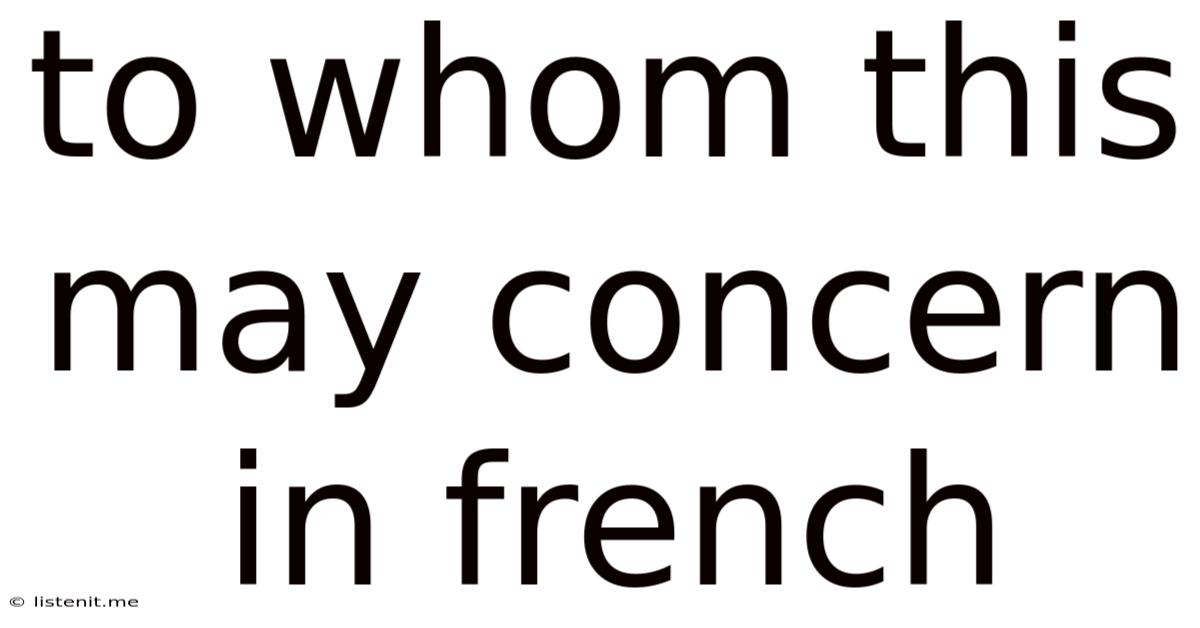To Whom This May Concern In French
listenit
Jun 14, 2025 · 4 min read

Table of Contents
To Whom It May Concern in French: A Comprehensive Guide
The phrase "To Whom It May Concern" is a common English salutation used when the recipient of a letter or document is unknown. While a direct translation in French might seem straightforward, the nuances of French etiquette require a more nuanced approach. This comprehensive guide will explore various options for addressing a letter or document in French when the recipient's name is unknown, offering context, examples, and best practices for different situations.
Understanding the Context: Why You Need Alternatives
In French, directly translating "To Whom It May Concern" as "À qui de droit" or "À qui il appartiendra" is technically correct, but often sounds stiff and impersonal. The choice of salutation depends heavily on the formality of the situation and your relationship (or lack thereof) with the intended recipient. A formal letter to a government agency demands a different approach than an informal email to a company's general inquiries inbox.
Formal Situations: Maintaining Professionalism
For formal communications, precision and respect are paramount. Using the incorrect salutation can undermine the professionalism of your message. Here are some options for formal situations:
1. Madame, Monsieur (Madam, Sir): The Classic Approach
This is the most common and generally accepted formal salutation in French. It addresses both genders simultaneously, maintaining a level of politeness and formality suitable for official correspondence. However, using "Madame, Monsieur" might be seen as slightly impersonal, especially in today's modern world striving for gender inclusivity.
Example:
Madame, Monsieur,
Je vous écris pour vous informer de... (I am writing to inform you of...)
2. Addressing a Specific Department or Title: A More Targeted Approach
If you know the specific department or the title of the person you are contacting, addressing the letter to that department or title is a more effective and respectful alternative. This shows that you have taken the time to research your recipient.
Example:
À la direction des ressources humaines, (To the Human Resources Department)
Au service client, (To the Customer Service Department)
À Monsieur le Directeur, (To Mr. Director)
3. Using a General Title with the Organization Name: Combining Formality and Specificity
Combining a general title with the organization's name offers a level of formality while specifying the intended recipient. This demonstrates awareness of the context and avoids impersonal broadness.
Example:
À l'attention de la direction de [Company Name], (To the attention of the management of [Company Name])
Informal Situations: Balancing Friendliness and Professionalism
While formality is crucial in official correspondence, there are times when a less formal approach is appropriate. This might be in an email to a company's general inquiries inbox or a letter to a smaller, less formal organization.
1. Bonjour (Hello): A Simple and Effective Greeting
For informal emails or letters, simply starting with "Bonjour" is often sufficient. It is friendly and less impersonal than "Madame, Monsieur," provided the overall tone of the message remains professional.
Example:
Bonjour,
Je vous contacte au sujet de... (I am contacting you regarding...)
2. Using a Specific Contact Name if Available: The Personal Touch
If you have a contact name, even if it's only from a general website contact form, using that name is always preferable. It personalizes your message and shows that you've made an effort to find the appropriate contact.
Example:
Bonjour [Contact Name],
J'espère que ce courriel vous trouve bien... (I hope this email finds you well...)
Choosing the Right Salutation: A Decision Tree
To help you choose the best salutation, consider this decision tree:
-
Do you know the recipient's name?
- Yes: Use their name.
- No: Proceed to step 2.
-
Is the communication formal (e.g., legal document, government correspondence)?
- Yes: Use
Madame, Monsieur, or a specific department/title. - No: Proceed to step 3.
- Yes: Use
-
Is the communication informal (e.g., email to a company's general inquiries)?
- Yes: Use
Bonjouror a general title if available.
- Yes: Use
Beyond the Salutation: Crafting a Compelling Message
Even with the right salutation, your letter or email needs to be well-written and persuasive. Here are some key elements:
- Clarity and Conciseness: Get straight to the point. French readers appreciate clear and concise communication.
- Professional Tone: Maintain a professional tone regardless of the level of formality.
- Correct Grammar and Spelling: Errors can undermine your credibility.
- Proper Formatting: Use clear headings, bullet points, and paragraph breaks to enhance readability.
- Call to Action: Clearly state what you want the recipient to do.
Conclusion: Mastering French Business Communication
Selecting the appropriate salutation is a crucial aspect of effective French business communication. While there's no single perfect translation for "To Whom It May Concern," understanding the context and choosing the most suitable option will greatly enhance the professionalism and impact of your message. By carefully considering the formality of the situation and applying the guidance outlined in this guide, you can confidently address your correspondence in French, ensuring your message is received positively and professionally. Remember, a well-crafted message, starting with the right salutation, sets the stage for a successful communication. Therefore, invest time in carefully selecting the appropriate greeting to make a positive first impression.
Latest Posts
Latest Posts
-
Macbook Connected To Wifi But No Internet
Jun 15, 2025
-
How Do You Get Hair Dye Off The Wall
Jun 15, 2025
-
Difference Between 0w 20 And 5w 20
Jun 15, 2025
-
Hope You Are Doing Good Reply
Jun 15, 2025
-
How Long Does It Take To Do An Alignment
Jun 15, 2025
Related Post
Thank you for visiting our website which covers about To Whom This May Concern In French . We hope the information provided has been useful to you. Feel free to contact us if you have any questions or need further assistance. See you next time and don't miss to bookmark.